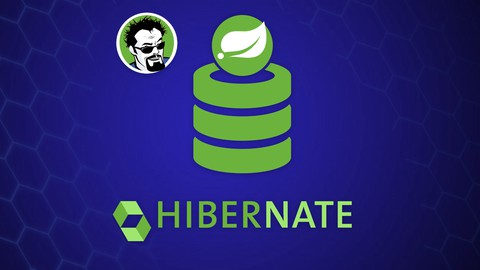 MP4 | Video: h264, 1280×720 | Audio: AAC, 44.1 KHz, 2 Ch
MP4 | Video: h264, 1280×720 | Audio: AAC, 44.1 KHz, 2 Ch
Genre: eLearning | Language: English | Duration: 94 lectures (10h 20m) | Size: 3.25 GB
Master Hibernate, the most popular Java ORM – Remove the mystery of Spring Data JPA
What you’ll learn:
Learn about the Java JPA Specification and the Hibernate JPA Implementation
How to Query Data with JDBC, JDBC Template, Hibernate, and Spring Data JPA
Learn how to use JPA’s Object Relational Mapping (ORM) to map Java POJOs to relational database tables
Understand JPA Relationships – One to One, One to Many, Many to One, and Many to Many
How to persist data to a relational database using JPA and Hibernate
How you can use Hibernate’s Paging and Sorting features
Understand Database Transactions and How you can control them
Use Liqibase and Flyway to Manage Database Migrations
Understand How to Implement the DAO pattern using JDBC, JDBC Template, Hibernate, and Spring Data JPA
Learn to Generate Database Schemas from JPA Entities Using Hibernate
Use Advanced JPA features to map Legacy Databases
Requirements
You have fun learning and want to understand how to use JPA with databases
Programming Experience with Java
Basic understanding of Spring Framework and Spring Boot
SQL Knowledge highly recommended
Description
Hibernate is the default JPA implementation used by Spring Data JPA.
JPA stands for Java Persistence API. This is a common Java API used to work with Relational Databases.
Spring Data JPA is an abstraction built on top of the JPA API specification.
Being an abstraction, Spring Data JPA makes working with database entities very efficient.
Spring Data JPA eliminates a lot of the boilerplate / cerimonial code, and allows developers to focus on developing business logic.
The downside of the efficient abstraction is that accessing the database can become a mystery. Developers who just understand how to use Spring Data JPA do not understand the complexities of JDBC and Hibernate.
You will start this course with a basic demonstration of Spring Data JPA. In this section you will learn how to work with a H2 in-memory database.
You’ll see how easy it is to work with Spring Data JPA. You will also begin to understand how the Hibernate interaction is being abstracted away.
Since JPA is the Java API for working with Relational Databases, the course takes a closer look at Relational Databases and MySQL specifically.
MySQL is the most popular open source relational database in the world. You will learn how to configure Spring Boot to test with a H2 in-memory database and to run integration tests against a MySQL database. This is a common real-world example leveraging the power of Spring and Hibernate to give you a very flexible environment.
Once we’ve established a persistent database, we can explore using database migration tools.
Liquibase and Flyway are two very popular database migration tools. Spring Boot supports both options. And you will learn about both options and database security best practices.
By establishing a MySQL database, Spring Boot Integration Tests, and automated database migrations we can use Test Driven Development to explore the features of JDBC and Hibernate.
In the course you will learn:
What is the DAO pattern, and how to implement it using JDBC, Spring’s JDBC Template, and Hibernate
Defining Primary Key’s with Hibernate
Hibernate Criteria Queries
Named JPA Queries
Paging and Sorting
Spring Data JPA query methods
Spring Data JPA @Query Annotation
Entity Relationships – One to One, One to Many, Many to One, Many to Many
Embedded Types
Natural Keys
Composite Keys
Database Mapping
Hibernate Listeners and Interceptors
JPA Database Mapping
Schema Generation using Hibernate
Legacy Database Mapping
Using Multiple Data Sources with JPA
Who this course is for
New Java Developers who wish to master working with Relational Databases
Spring Developers who want to take the mystery out of Spring Data JPA
Password/解压密码www.tbtos.com
转载请注明:0daytown » Hibernate and Spring Data JPA: Beginner to Guru